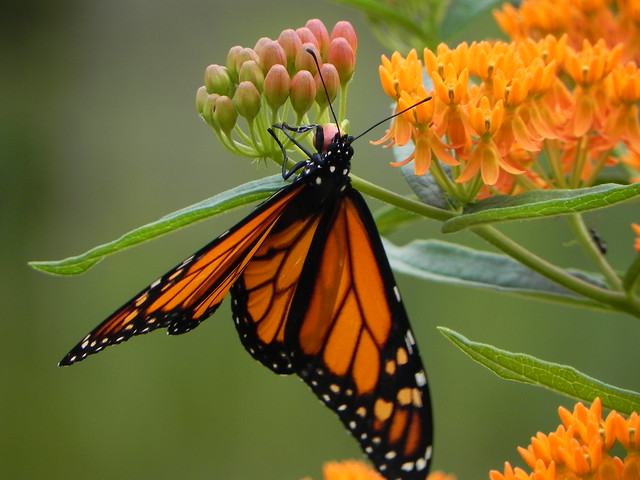By Jeff Tome, Public Engagement Specialist
July is a month for insects.
That statement generally hits people in one of three ways. Some people will stay inside for the month of July to avoid them. Some folks will be utterly indifferent. Others will go out and celebrate them. For me, celebrating them is important.
There is a part of me that always roots for the underdog, and insects definitely feel like a persecuted underdog. They get horrible press. News stories that feature insects are generally about the spread of disease, insect pests destroying crops and gardens, how to eliminate ants or termites, or ways to prevent or help with wasp and bee stings. Honestly, insects could use a few more stories about how incredible they are.
Why should insects be loved? Let’s start with what they do for people. Insects are amazing pollinators. Scientists say that about one bite in three comes from a bee. Bees pollinate the flowers that turn into apples, blueberries, raspberries and tomatoes. Without them, we would struggle to help flowers turn into fruit and food.

Years ago, when I started working for Audubon Community Nature Center, we did a program for summer camp where children took over the jobs of insects. One of the things they had to do was to use small paint brushes to gather pollen from one flower and transfer it to another flower. The goal was for children to see how hard bees worked to pollinate the flowers and turn them into seeds. Children mostly found running around in a hot summer field more tedious than enlightening, but the point was valid: bees work hard to gather pollen and nectar and incidentally pollinate flowers as they go.
While bees are important pollinators, the importance of Honeybees may be overstated, or at least over-recognized. There are over 400 species of bees native to NY and Pennsylvania, ranging from the fuzzy, well-known bumblebees to the smaller cellophane bees. Honeybees came from Europe with colonists. As one beekeeper told me, they are more like tiny flying herds of cows. They are kept for the honey they make as well as the pollination services they provide. According to a 2021 Scientific American article, “Honey bees are extreme generalist foragers and monopolize floral resources, thus leading to exploitative competition—that is, where one species uses up a resource, not leaving enough to go around.”
Distinctions between the importance of Honeybees vs. other bees aside, bees are important for their role in creating food. My wife and I have noticed that there seem to be fewer bees this year, but can’t point to a reason why in the neighborhood. Native bees are in decline, and the fuzzy American bumblebee population is down 90% since the year 2000, according to the Center for Biological Diversity.
Insects help make food, but what else do they do that is important? Disgustingly, they eat dead animals. I once watched maggots reduce a bear carcass to bones and fur in just a couple of weeks. Insects also eat animal droppings. The world would be a lot smellier and more disgusting without insect cleanup crews coming through.
Insects are the basis of many food chains. Insects eat plants and are then eaten by birds, bats and other animals. One study by Douglas Tallamy showed that one family of Carolina Chickadees fed one clutch of babies up to 5,000 caterpillars and other insects. People who fly fish are very familiar with using pretend insects to attract fish. The flies that they bait their hooks with resemble the mayflies, stoneflies and caddisflies that are naturally in the creek.

July is a month for insects, and I have planted my yard with plants to encourage the ones I enjoy. Butterfly plants and caterpillar food plants are throughout the yard to encourage butterflies and moths. Plants that are well-loved by native bees, especially bumblebees, are planted throughout the yard. In turn, those bumblebees will visit the flowers in my garden and help pollinate blueberries and tomatoes and peppers and beans. Leaves are left on the ground in the fall, encouraging lots of fireflies to live in the yard. Along the way, many other insects find their way to the space we created.
Audubon Community Nature Center builds and nurtures connections between people and nature. ACNC is located just east of Route 62 between Warren and Jamestown. The trails are open from dawn to dusk and birds of prey can be viewed anytime the trails are open. The Nature Center is open from 10 a.m. until 4:30 p.m. daily except Sunday when it opens at 1 p.m. More information is online at auduboncnc.org or by calling (716) 569-2345.


Recent Comments